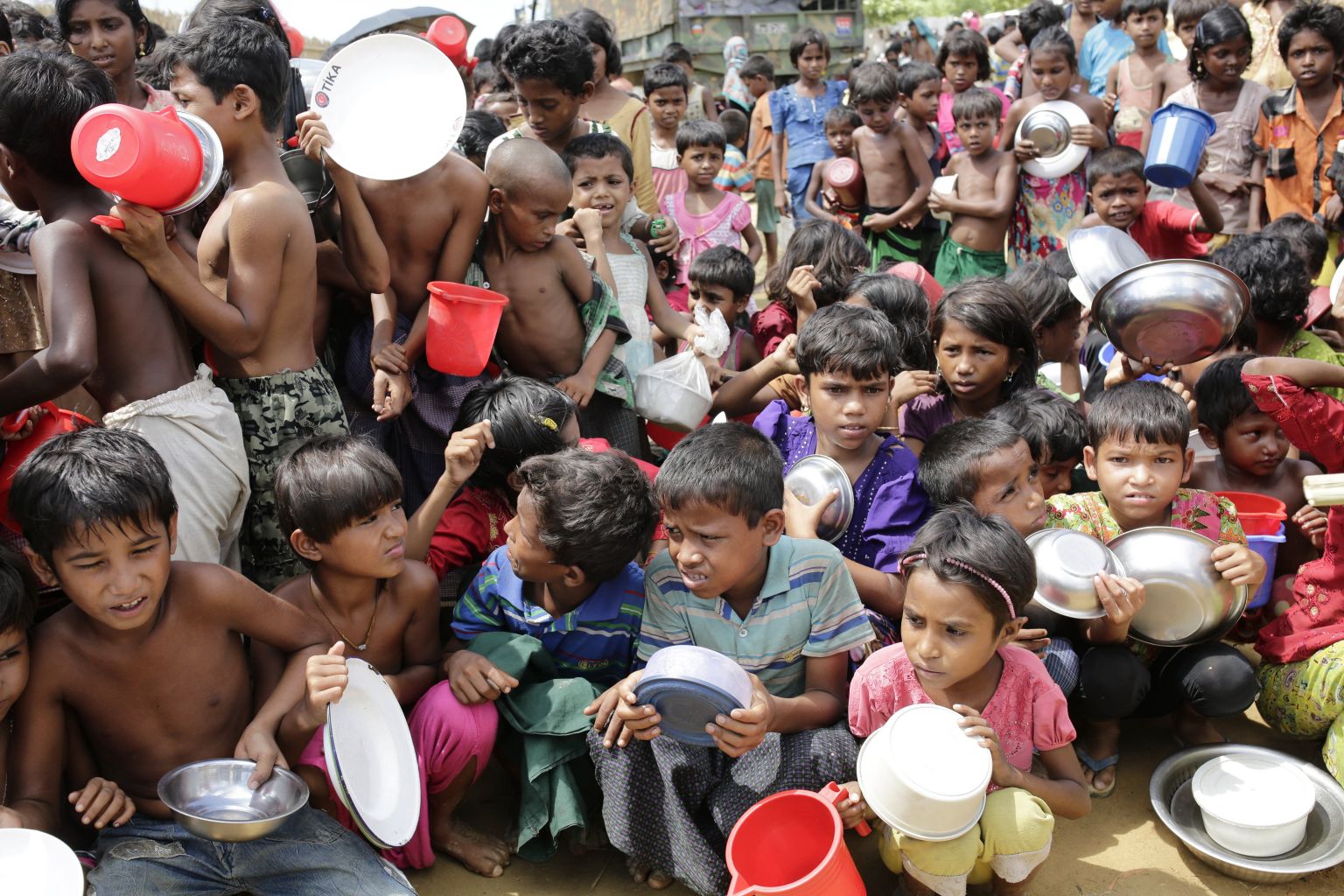Myanmar army chief says Rohingya not native
Sign up now: Get insights on Asia's fast-moving developments

Rohingya children waiting outside a food centre to collect lunch at a camp in Palonkhali, Cox's Bazar, Bangladesh, on Oct 11, 2017.
PHOTO: EPA-EFE
Follow topic:
YANGON (REUTERS, AFP) - Rohingya Muslims are not native to Myanmar, the army chief has told the United States ambassador in a meeting in which he apparently did not address accusations of abuses by his men and said media was complicit in exaggerating the number of refugees fleeing.
Senior General Min Aung Hlaing gave his most extensive account of the Rohingya refugee crisis aimed at an international audience in the meeting with Ambassador Scot Marciel, according to a report posted on his Facebook page on Thursday (Oct 12).
The general is the most powerful person in Buddhist-majority Myanmar and his apparently uncompromising stance would indicate little sensitivity about the military's image over a crisis that has drawn international condemnation and raised questions about a transition to democracy under Nobel laureate Aung San Suu Kyi.
The military campaign is popular in Myanmar, where there is little sympathy for the Rohingya, and where Buddhist nationalism has surged. Mr Min Aung Hlaing, referring to Rohingya by the term "Bengali", which they regard as derogatory, said British colonialists were responsible for the problem.
"The Bengalis were not taken into the country by Myanmar, but by the colonialists," he told Mr Marciel, according to the account of the meeting posted on Thursday. "They are not the natives, and the records prove that they were not even called Rohingya but just Bengalis during the colonial period."
The United Nations human rights office said on Wednesday Myanmar security forces had brutally driven out half a million Rohingya from northern Rakhine state to Bangladesh, torching their homes, crops and villages to prevent them from returning.
The UN Security Council will on Friday hold an informal meeting on Myanmar to hear former UN chief Kofi Annan provide details of a report on the plight of Rohingya Muslims, diplomats said. The UN's top political affairs official, Jeffrey Feltman, will travel to Myanmar on Friday for four days of talks on the crisis
Meanwhile, Rohingya Muslim villagers cut off from food and threatened by Buddhist neighbours in Myanmar's violence-racked Rakhine state received their first substantial food supplies in months on Wednesday (Oct 11) after international pressure on the government to help.
Diplomats and aid groups called on the government to step in after Reuters exclusively reported the dire situation faced by thousands of Rohingya Muslims trapped in the villages of Ah Nauk Pyin and Nyaung Pin Gyi last month.
"A boat arrived yesterday evening with rice bags, and six Red Cross staff came to our village this morning," Mr Maung Maung, an administrator in the riverside Rohingya village of Ah Nauk Pyin, told Reuters by telephone.
He said it was the first time in three months that significant supplies of food had been delivered to the village.
"The aid arrived just as we're starving," he said.
Fragile relations between the Rohingya villagers and their ethnic Rakhine Buddhist neighbours were shattered on Aug 25, when deadly attacks by Rohingya militants prompted a ferocious response from Myanmar's security forces.
Rights groups say ethnic Rakhine Buddhists have joined in attacks on Rohingya, and the residents of Ah Nauk Pyin told Reuters in mid-September they had been threatened by Buddhists and had pleaded with the authorities for safe passage out.
The state government told them to stay put.
More than half a million Rohingya villagers have fled to Bangladesh to escape what the United Nations has called a"textbook example of ethnic cleansing" aimed at pushing the Rohingya out of the country for good.
Myanmar dismisses that. It says it is fighting a legitimate campaign against Rohingya "terrorists".
Hundreds of thousands of Rohingya remain in Rakhine, many in fear of their security and facing growing hunger as food supplies dwindle, partly because of restrictions on the trade and movement of rice.
Minister for Relief and Resettlement Win Myat Aye, who is leading the government response to the humanitarian crisis unfolding in Rakhine, confirmed that the aid had arrived in Ah Nauk Pyin.
He said the government would support all vulnerable people.
"We'll support these people continuously, until they can stand on their own feet," he said. "Nobody wants to rely on aid all their lives."
After Reuters reported on the plight of Ah Nauk Pyin, and the nearby village of Nyaung Pin Gyi, Myanmar-based diplomats had asked to visit on a government-organised trip to Rakhine state last week.
Mr Win Myat Aye has been to Ah Nauk Pyin several times with Rakhine state government officials, and has promised to protect the residents.
Myanmar has restricted access to Rakhine for most aid agencies, despite growing international calls for humanitarian groups to be allowed in to help.
Aid is being organised by three Red Cross organisations - the Myanmar Red Cross, the International Federation of Red Cross and Red Crescent Societies and the International Committee of the Red Cross (ICRC).
The aid to the 600 families of Ah Nauk Pyin delivered on Wednesday included rice, oil, beans, salt, sugar and tinned fish for a month.
Residents of the other Rohingya village, Nyaung Pin Gyi, said they had not been visited and had yet to get any aid but ICRC communications official Khin Htay Oo said Nyaung Pin Gyi would get food aid on Tuesday.
"We help all people affected by the conflict, we do not take sides based on race or religion," she said.

